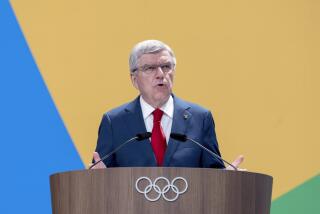ASIA : Beijing Racing to Get in Shape to Compete for the 2000 Olympics : The city is transforming itself. But a winning bid would appall rights activists.
BEIJING â Possible victory for Beijing in bidding to host the 2000 Olympics is a prospect that warms the hearts of Chinaâs leaders and chills Western human rights activists.
If British bookmakers know their stuff, Chinaâs once-high hopes of winning the Games for the year 2000 are fading. Boosted by a favorable report on its bid, Sydney, Australia, is now the odds-on favorite.
But Beijing is still generally seen as Sydneyâs main challenger. And whatever the result of Sept. 23 voting in Monte Carlo, Beijingâs bid for the prestigious Olympic date has already helped power a physical transformation of this city.
Recognizing weaknesses in their bid, authorities here have made all-out efforts to upgrade transportation facilities and generally modernize Beijing as quickly as possible. A new highway from the airport into the city and conversion of two key âring roadsâ into limited-access freeways are among the high-profile infrastructure efforts undertaken with the September Olympic vote in mind.
Modern hotels have sprouted rapidly, and in recent months streets have been flooded with new yellow taxis in a show of improved transportation service.
âBeijing will invest in the coming seven years $3.4 billion to upgrade its telecommunications system,â He Zhenliang, president of the Chinese Olympic Committee, said recently.
âThe central and municipal governments will invest $7.5 billion . . . to modernize the city through the construction of infrastructure projects such as the new airport terminal, new railroad station, extension of the underground railroad system and the roads,â he added. âAnd work to set down a natural gas pipeline will soon begin. . . . It will provide the capital with energy other than coal, reducing 70% of the total number of existing chimneys in Beijing. By the year 2000, Beijing will have 70,000 rooms in star-graded hotels.â
The city is festooned with billboards and banners proclaiming in English, âA More Open China Awaits 2000 Olympics.â In Chinese, the slogan is rendered in a slightly more restrained manner: âAn Open China Hopes for the Olympics.â
Western critics say that after the 1989 massacre of pro-democracy protesters in Beijing, it would be unconscionable for the world community to award the Olympics to China unless there first is a major easing of political repression. The U.S. House of Representatives voted 287-99 to urge the American delegate to vote in Monte Carlo against Beijingâs bid.
Some, however, argue that allowing China to host the Olympics would promote further reform and openness here.
Beijingâs Olympic bid committee, in what can be viewed either as an incredible display of chutzpah or an extraordinary lack of sensitivity to public relations, has sought to project the lack of freedom in China as an asset for holding the Games. âNeither now nor in the future will there emerge in Beijing organizations opposing Beijingâs bid and the hosting of the 2000 Olympiad,â the committee pledged in its formal application to host the Games.
In a further irony, the Olympic bid committee is headed by Beijing City Communist Party Secretary Chen Xitong, a prominent hard-liner who played a key role in advocating the 1989 crackdown.
Under Olympic rules, politics are not supposed to play a role in selection of Olympic sites. This is a point often stressed by Chinese officials, even as Beijingâs desire to host the Olympics clearly has strong political motivations.
Winning the Games would mark Beijingâs full recovery of legitimacy in the international community and enable the government to work toward a gala international celebration of Chinaâs modernization efforts.
More to Read
Go beyond the scoreboard
Get the latest on L.A.'s teams in the daily Sports Report newsletter.
You may occasionally receive promotional content from the Los Angeles Times.






